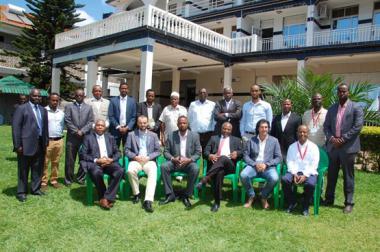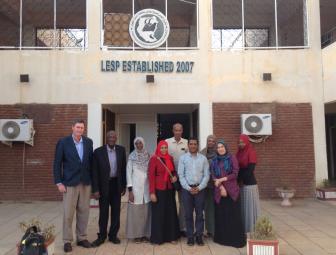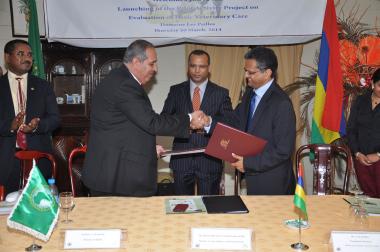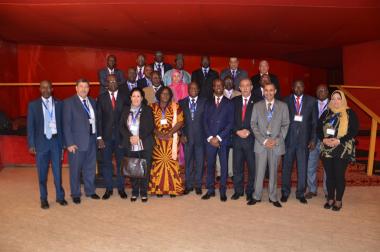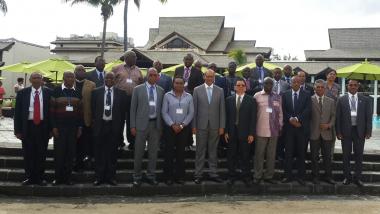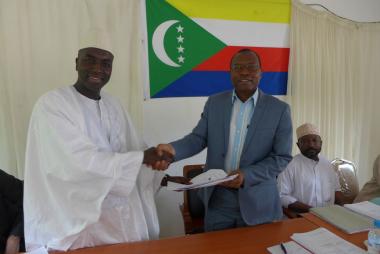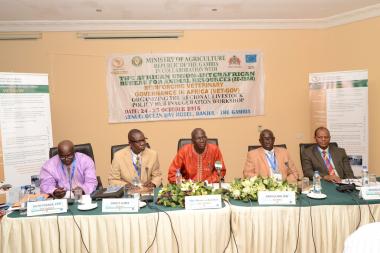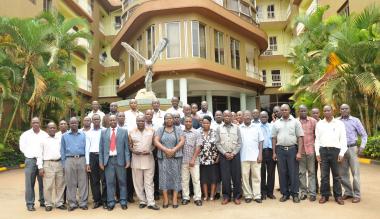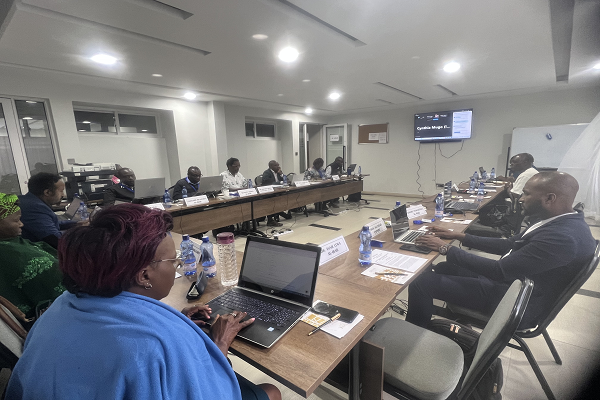
AU-IBAR, in collaboration with ILRI and the Global Agenda for Sustainable Livestock, is conducting a hybrid Expert Write Shop in Naivasha, Kenya, from June 18th to 21st, 2024, as part of the Resilient African Feed and Fodder Systems (RAFFS) Project. The objective of this event is to improve stakeholder engagement and increase the visibility and inclusion of livestock in the Post Malabo Comprehensive Africa Agriculture Development Programme (CAADP) agenda. The critical role of livestock in the attainment of CAADP objectives is being addressed by experts from a variety of sectors and institutions. Experts from diverse sectors and institutions will delve into why specific areas—such as disease control, sustainable feed and fodder systems, and youth engagement—are pivotal, while also highlighting Future Outlook (priorities and interventions), identifying indicators to measure progress and ensure accountability in advancing the livestock sector in the next-ten years.
Key representatives delivered opening remarks, including Dr. Isabelle Baltenweck from the International Livestock Research Institute (ILRI), Dr. Paul Guthiga from AKADEMIYA2063, and Dr. Charles Bodjo, Director of the Pan African Veterinary Vaccine Centre (PANVAC). Dr. Isabelle Baltenweck emphasized the importance of not neglecting livestock, stating that it should be brought to the forefront of discussions. She stressed the need for robust evidence to support this cause and encouraged collaboration among stakeholders to ensure memoranda and technical working groups prioritize livestock.
Dr. Paul Guthiga highlighted the necessity of leadership that supports this process. He pointed out that CAADP serves as a vehicle for implementation, with many African Union Member States (AU-MS) relying heavily on livestock. He emphasized the importance of providing AU-MS with the data and opportunities for mutual learning to meet their needs, asserting that livestock holds a critical seat in the development agenda due to its importance.
Dr. Charles Bodjo underscored the significance of disease control, advocating for high-quality vaccines and the strengthening of vaccine production capacity across the continent. He called for harmonized standards for vaccine production and a network of regulators to oversee vaccine distribution. Additionally, he highlighted the need for effective approaches to animal production and disease control to enhance market access.
Dr. Annie Lewe, representing AU-IBAR’s Director, Dr. Huyam Salih, spoke at the opening of the meeting. She highlighted the challenges Africa's food systems face due to inefficiencies, waste, and dependence on global supply chains. Dr. Lewe pointed out that Africa's demographics and regional integration efforts position it as a vibrant and growing market, with livestock being the fastest-growing agricultural sector in some countries. She noted that the livestock sector has a substantial multiplier effect, driving growth in other sectors. Africa, with the largest youth dividend globally, has 24% of its youth engaged in the livestock sector.
On the first day, the meeting featured presentations on the significance of livestock in achieving CAADP goals. Dr. Sarah Ashanut Ossiya and Dr. Paul Guthiga provided insights into effective participation in the Post-Malabo agenda process, including the preparation of memoranda towards the process.
The first day’s opening session included presentations on various aspects of the livestock sector and propoised indicators for the Post-Malabo agenda. Topics included the consumption of animal source foods, government investment in livestock, pastoralism for prosperity, animal biotechnology for food and nutrition security, the contribution of livestock to ecosystem services and the green economy, and the One Health approach to animal health and welfare. These presentations emphasized the protection of productive assets, performance improvement, trade, and veterinary public health.
Prof. Abdullahi Yusuf from the University of Pretoria presented on "Pollination Services: An Untapped Input for Enhancing Productivity in Crops Essential for Attainment of Elusive Nutrition Targets."
The second day of the workshop is dedicated to drafting various memoranda, followed by a validation exercise involving stakeholders, integrating their input, and finalizing the documents.
This comprehensive writeshop ensures that all stakeholders are well-informed and actively engaged in shaping the future of livestock inclusion in the Post-Malabo CAADP agenda. As noted by the AU-IBAR Director, previous declarations such as the CAADP, Maputo Declaration, and Malabo Declaration have not fully captured Africa's vast livestock resources. The Kampala Declaration aims to ensure that Africa's livestock sector is recognized as a significant contributor to the continent's growth, transformation, and resilience. In a global context where livestock resources are being challenged, it is crucial to track and provide accountability for key measures. AU-IBAR, commissioned by AU Member States to lead the development of animal resources, remains committed to better inclusion of livestock in the post-Malabo Agenda.

